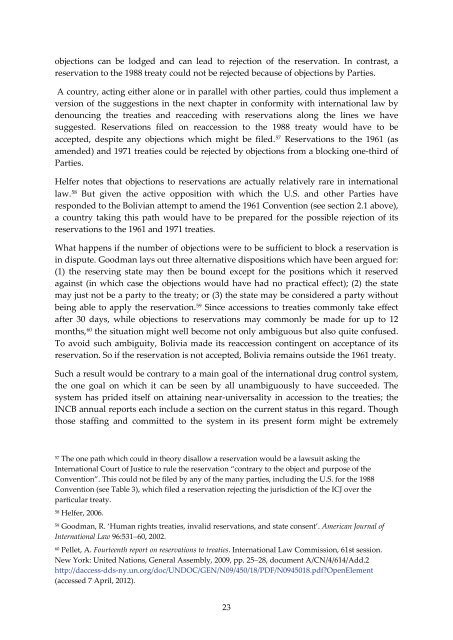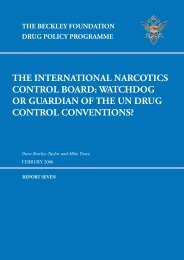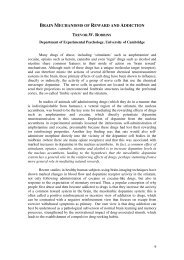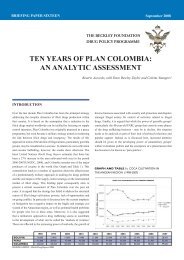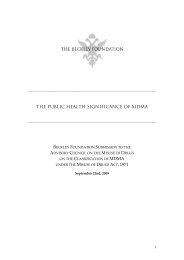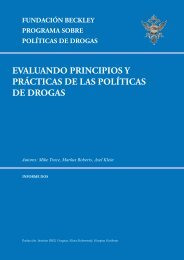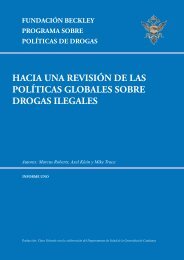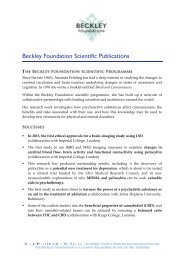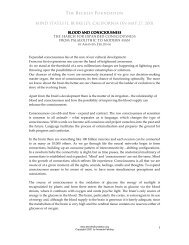objections can be lodged and can lead <strong>to</strong> rejection of <strong>the</strong> reservation. In contrast, areservation <strong>to</strong> <strong>the</strong> 1988 treaty could not be rejected because of objections by Parties.A co<strong>un</strong>try, acting ei<strong>the</strong>r alone or in parallel with o<strong>the</strong>r parties, could thus implement aversion of <strong>the</strong> suggestions in <strong>the</strong> next chapter in conformity with international law bydeno<strong>un</strong>cing <strong>the</strong> treaties and reacceding with reservations along <strong>the</strong> lines we havesuggested. Reservations filed on reaccession <strong>to</strong> <strong>the</strong> 1988 treaty would have <strong>to</strong> beaccepted, despite any objections which might be filed. 57 Reservations <strong>to</strong> <strong>the</strong> 1961 (asamended) and 1971 treaties could be rejected by objections from a blocking one-third ofParties.Helfer notes that objections <strong>to</strong> reservations are actually relatively rare in internationallaw. 58 But given <strong>the</strong> active opposition with which <strong>the</strong> U.S. and o<strong>the</strong>r Parties haveresponded <strong>to</strong> <strong>the</strong> Bolivian attempt <strong>to</strong> amend <strong>the</strong> 1961 Convention (see section 2.1 above),a co<strong>un</strong>try taking this path would have <strong>to</strong> be prepared for <strong>the</strong> possible rejection of itsreservations <strong>to</strong> <strong>the</strong> 1961 and 1971 treaties.What happens if <strong>the</strong> number of objections were <strong>to</strong> be sufficient <strong>to</strong> block a reservation isin dispute. Goodman lays out three alternative dispositions which have been argued for:(1) <strong>the</strong> reserving state may <strong>the</strong>n be bo<strong>un</strong>d except for <strong>the</strong> positions which it reservedagainst (in which case <strong>the</strong> objections would have had no practical effect); (2) <strong>the</strong> statemay just not be a party <strong>to</strong> <strong>the</strong> treaty; or (3) <strong>the</strong> state may be considered a party withoutbeing able <strong>to</strong> apply <strong>the</strong> reservation. 59 Since accessions <strong>to</strong> treaties commonly take effectafter 30 days, while objections <strong>to</strong> reservations may commonly be made for up <strong>to</strong> 12months, 60 <strong>the</strong> situation might well become not only ambiguous but also quite confused.To avoid such ambiguity, Bolivia made its reaccession contingent on acceptance of itsreservation. So if <strong>the</strong> reservation is not accepted, Bolivia remains outside <strong>the</strong> 1961 treaty.Such a result would be contrary <strong>to</strong> a main goal of <strong>the</strong> international <strong>drug</strong> control system,<strong>the</strong> one goal on which it can be seen by all <strong>un</strong>ambiguously <strong>to</strong> have succeeded. Thesystem has prided itself on attaining near-<strong>un</strong>iversality in accession <strong>to</strong> <strong>the</strong> treaties; <strong>the</strong>INCB annual reports each include a section on <strong>the</strong> current status in this regard. Thoughthose staffing and committed <strong>to</strong> <strong>the</strong> system in its present form might be extremely57The one path which could in <strong>the</strong>ory disallow a reservation would be a lawsuit asking <strong>the</strong>International Court of Justice <strong>to</strong> rule <strong>the</strong> reservation “contrary <strong>to</strong> <strong>the</strong> object and purpose of <strong>the</strong>Convention”. This could not be filed by any of <strong>the</strong> many parties, including <strong>the</strong> U.S. for <strong>the</strong> 1988Convention (see Table 3), which filed a reservation rejecting <strong>the</strong> jurisdiction of <strong>the</strong> ICJ over <strong>the</strong>particular treaty.58Helfer, 2006.59Goodman, R. ‘Human rights treaties, invalid reservations, and state consent’. American Journal ofInternational Law 96:531−60, 2002.60Pellet, A. Fourteenth report on reservations <strong>to</strong> treaties. International Law Commission, 61st session.New York: United Nations, General Assembly, 2009, pp. 25−28, document A/CN/4/614/Add.2http://daccess-dds-ny.<strong>un</strong>.org/doc/UNDOC/GEN/N09/450/18/PDF/N0945018.pdf?OpenElement(accessed 7 April, 2012).23
<strong>un</strong>happy about a co<strong>un</strong>try implementing a change in <strong>the</strong>ir situation in this manner, <strong>to</strong>deny reaccession would be a dramatic retreat from <strong>the</strong> goal of <strong>un</strong>iversality that it isdoubtful <strong>the</strong> international system would want <strong>to</strong> take.The main disincentive <strong>to</strong> a co<strong>un</strong>try taking this path arises less from a threat of exclusionthan from pressures and co<strong>un</strong>termeasures outside <strong>the</strong> <strong>drug</strong> control system (e.g.economic sanctions) that could be threatened by <strong>the</strong> U.S. and o<strong>the</strong>r main supporters of<strong>the</strong> system. As an example of such pressures, in response <strong>to</strong> Bolivia’s actions, on 19March, 2012, <strong>the</strong> European Commission decided <strong>to</strong> ‘initiate an investigation in order <strong>to</strong>establish whe<strong>the</strong>r <strong>the</strong> den<strong>un</strong>ciation of <strong>the</strong> UN Single Convention on Narcotic Drugsjustifies a temporary withdrawal of <strong>the</strong> special incentive arrangement for sustainabledevelopment and good governance for products originating in Bolivia’. 61 There wouldbe more safety in numbers against <strong>the</strong>se pressures and threatened co<strong>un</strong>termeasures,which makes a coordinated series of den<strong>un</strong>ciations and reaccessions a path worthconsidering for like-minded co<strong>un</strong>tries wishing <strong>to</strong> implement ei<strong>the</strong>r of <strong>the</strong> Optionsdiscussed in Chapter 6.3.4 Passing co<strong>un</strong>termanding national legislationA path which is <strong>the</strong>oretically open <strong>to</strong> some co<strong>un</strong>tries, but not <strong>to</strong> o<strong>the</strong>rs, is <strong>to</strong> nullify aninternational commitment with a new national law. States in which international treatiesare constitutionally ‘on <strong>the</strong> same footing as national legislation’ may pass laws whichsupersede treaty obligations <strong>un</strong>der <strong>the</strong> ‘last in time’ rule. 62 In <strong>the</strong> U.S., for instance,national legislation can thus nullify a commitment in international law. 63 Depending on<strong>the</strong> constitutional and legal situation, this is also possible in some o<strong>the</strong>r co<strong>un</strong>tries. 64 ‘It isby no means settled as a general principle whe<strong>the</strong>r treaties prevail over domestic rules’,a leading textbook notes after a 20-page review of <strong>the</strong> situation in a number ofco<strong>un</strong>tries. 65 Such an approach would, however, be a direct challenge <strong>to</strong> internationalnormative expectations, and co<strong>un</strong>tries taking this path could expect considerableinternational opprobrium and pressure.61European Commission. Commission implementing decision of 19 March 2012 (2012/161/EU).Official Journal of <strong>the</strong> European Union 20.3.2012. http://eurlex.europa.eu/LexUriServ/LexUriServ.do?uri=OJ:L:2012:080:0030:0030:EN:PDF(accessed 28 March,2012).62Cassese, A. International Law, 2nd ed., p. 222. Oxford, etc.: Oxford University Press, 2005.63Ku, J. ‘Treaties as laws: a defense of <strong>the</strong> last in time rule for treaties and federal statutes’. Indiana LawJournal, 80: 319−91, 2005; Bianchi, A. ‘International law and US courts: <strong>the</strong> myth of Lohengrinrevisited’. European Journal of International Law 15(4):751−81, 2004.64Conforti, B. International Law and <strong>the</strong> Role of Domestic Legal Systems. Leiden: Martinus Nijhoff, 1993.65Shaw, M.N. International Law, 6th edition. 1st South Asian edition, p. 178. Cambridge, etc.:Cambridge University Press, 2010.24
- Page 2 and 3: ROADMAPS TO REFORMINGTHE UN DRUG CO
- Page 4 and 5: ContentsPreface ...................
- Page 6 and 7: PrefaceTHE IDEA FOR this Report cam
- Page 8: PART I. POSSIBLE ROADMAPS
- Page 11 and 12: hope for serious progress, but we c
- Page 13 and 14: We do not underestimate the difficu
- Page 15 and 16: also imposes requirements concernin
- Page 17 and 18: domestic market, just as producers
- Page 19 and 20: Protocol strengthened some provisio
- Page 21 and 22: ut considerably less potency than s
- Page 23 and 24: has announced its intention to reac
- Page 25 and 26: objected to. Concerning the 1971 tr
- Page 27 and 28: Table 2. Summary of reservations to
- Page 29 and 30: Reservations about traditional use
- Page 31: As Swaine notes, ‘the Vienna Conv
- Page 35 and 36: Preemption by a new ‘single conve
- Page 37 and 38: and their effort was rejected by a
- Page 39 and 40: national or subnational level. Proh
- Page 42 and 43: Chapter 5. Proposed treaty amendmen
- Page 44 and 45: Article 1. DefinitionsExcept where
- Page 46 and 47: Article 36 - penal provisionsIn Art
- Page 48 and 49: Article 7. Special Provisions regar
- Page 50 and 51: and to ensure adequate supplies of
- Page 52 and 53: Article 1 − definition of ‘cons
- Page 54 and 55: Article 19 - estimates of drug requ
- Page 56 and 57: Article 21. Limitation of Manufactu
- Page 58 and 59: contrary to a law or regulation ado
- Page 60 and 61: 1. in subparagraph (a):a) after ‘
- Page 62 and 63: ) for ‘in accordance with paragra
- Page 64 and 65: include a number of general stateme
- Page 66 and 67: the legality of drug possession. A
- Page 68 and 69: Chapter 7. Conforming the 1961 Conv
- Page 70 and 71: solely by Article 30, which require
- Page 72 and 73: on trade activities referred to in
- Page 74 and 75: (c) Require that licensed manufactu
- Page 76 and 77: issued in the form of counterfoil b
- Page 78: APPENDIXDETAILED COMMENTARY ON AMEN
- Page 81 and 82: Articles 21-34 of the Convention im
- Page 83 and 84:
dispatch, transport, supply, purcha
- Page 85 and 86:
actions involving commercial quanti
- Page 87 and 88:
In the 1971 Convention the followin
- Page 89 and 90:
4.1.3 Option 2 - changes to Preambl
- Page 91 and 92:
separate estimates and statistical
- Page 93 and 94:
After ‘scientific research’, in
- Page 95 and 96:
would also include transforming a d
- Page 97 and 98:
(c) subject to the provisions of th
- Page 99 and 100:
endangered’ by a Party’s failur
- Page 101 and 102:
Article 9. Composition and Function
- Page 103 and 104:
2. The Board shall, in respect of c
- Page 105 and 106:
for the right of the INCB to establ
- Page 107 and 108:
) Subject to the deductions referre
- Page 109 and 110:
excess quantity must be deducted fr
- Page 111 and 112:
prohibition in Article 31(1)(b) aga
- Page 113 and 114:
4.8 Article 20 - statistical return
- Page 115 and 116:
separate returns would be required
- Page 117 and 118:
4.9.1 General comments on Article 2
- Page 119 and 120:
distributors), and any quantity tak
- Page 121 and 122:
a) The quantity consumed, within th
- Page 123 and 124:
Article 21 bis. Limitation of Produ
- Page 125 and 126:
to engage in cultivation; and culti
- Page 127 and 128:
the purposes of Option 2. However,
- Page 129 and 130:
in Article 29 to manufacture of mor
- Page 131 and 132:
) (i) Require medical prescriptions
- Page 133 and 134:
4.15 Article 31(1) - international
- Page 135 and 136:
commercial use. Export to a state o
- Page 137 and 138:
would automatically mean that posse
- Page 139 and 140:
preparatory acts, conspiracy and at
- Page 141 and 142:
offering for sale, distribution, 17
- Page 143 and 144:
Article 36. Penal Provisions1. a) S
- Page 145 and 146:
Article 36. Penal Provisions1. a) S
- Page 147 and 148:
Conference would have intended to a
- Page 149 and 150:
drugs (in more than small quantitie
- Page 151 and 152:
substances into its country or one
- Page 153 and 154:
apply to Schedule 1 substances. In
- Page 155 and 156:
substances (of more than a small qu
- Page 157 and 158:
1. The Parties shall require that t
- Page 159 and 160:
individuals may lawfully obtain, us
- Page 161 and 162:
4. The Parties shall furnish to the
- Page 163 and 164:
2. In subparagraph (b):a) after ‘
- Page 165 and 166:
obligations on Parties in respect o
- Page 167 and 168:
penalise preparatory acts in connec
- Page 169 and 170:
accordance with subparagraph (a) of
- Page 171 and 172:
Article 3(1)(c)(iii) warrants speci
- Page 173 and 174:
6.1.2. Option 1 - changes to the 19
- Page 175 and 176:
uncertainty. Accordingly, Article 3
- Page 177 and 178:
Consequently, Parties would also no
- Page 179:
…4. d) The Parties may provide, e


